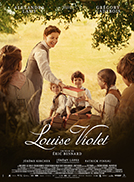Louise Violet

| Original title: | Louise Violet |
| Director: | Éric Besnard |
| Release: | Cinema |
| Running time: | 108 minutes |
| Release date: | Not communicated |
| Rating: |
Mulder's Review
With this review, I pay tribute to my own mother, a former school teacher, whose passion for education continues to inspire me every day.
In Louise Violet, Éric Besnard takes us to the heart of France in 1889, where a schoolteacher, powerfully played by Alexandra Lamy, is sent to a remote village to impose the Republic's school system - free, compulsory and secular. This story, rich in symbolism and emotion, not only traces the challenges of an era marked by rural conservatism, but also explores the inner struggles of a woman shattered by her past, trying to find her place in a hostile world.
Louise Violet's historical accuracy is one of the film's great successes. Shot in the natural settings of the Haute-Loire and Puy-de-Dôme regions, Eric Besnard and his team immerse us in the seasons, landscapes and rhythms of life in peasant France at the end of the 19th century. Laurent Dailland's camera captures every detail - from Madeline Fontaine's realistic costumes to the farm chores - bringing to life a way of life that has all but disappeared. This visual authenticity is reinforced by a contemplative rhythm that matches the slow tempo of the period, far removed from our fast-paced, artificial modern world.
Alexandra Lamy plays Louise Violet with a rare intensity, gradually revealing the complexity of this multi-faceted character. The survivor of a family tragedy that deprived her of her husband and children, Louise hides latent anger and unfailing determination. She carries within her the strength of resilience, a trait reinforced by the hardness of her features at the start of the film, then a certain gentleness that emerges as she begins to be accepted by the villagers. Alexandra Lamy's performance in this dramatic role is nuanced and controlled, and her transformation, both physical and emotional, follows Louise's journey towards a kind of inner redemption.
Louise's mission is fraught with pitfalls: she has to contend with villagers who see education as a threat. For them, the ownership of their land and their traditions are worth more than the progress their children's education could bring. This conflict, embodied by characters such as Rémi (played by Jérémy Lopez), opposed to social change, and Joseph, the mayor (Grégory Gadebois, once again perfect), captures all the tension between republican values and a peasant world anchored in ancestral convictions. Gadebois, with his sobriety and depth, perfectly embodies this evolving patriarchal figure, touched by Louise's charisma and firmness.
Beyond its historical dimension, Louise Violet is an allegory for today's struggles for secularism and education. Éric Besnard, whose commitment to these republican values is well known, uses this context to remind us of the importance of equal access to knowledge. Louise becomes a symbol of progress, openness and modernity in the face of a closed and distrustful society. By anchoring this theme in a 19th-century reality, Besnard demonstrates that the battle for secular education has been, and remains, a fundamental issue in our society.
Louise Violet is more than just a historical drama; it's a tribute to all women teachers and their role in building a fairer, more enlightened society. Éric Besnard's delicate yet powerful work is carried by a dazzling Alexandra Lamy. The film is a touching reminder of the price of knowledge and the resilience of those who fight to pass on this precious asset to future generations. It's our favorite film of the year, and a must-see for me as a film buff.
Louise Violet
Written and directed by Éric Besnard
Produced by Philippe Logie, Patrick Quinet, Christophe Rossignon
Starring Alexandra Lamy, Grégory Gadebois, Jérôme Kircher, Manon Maindivide, Annie Mercier, Jérémy Lopez, Patrick Pineau
Music by Christophe Julien
Cinematography : Laurent Dailland
Edited by Lydia Decobert
Production companies: Nord-Ouest Films, StudioCanal, Apollo Films, France 3 Cinéma, Auvergne-Rhône-Alpes Cinéma, Artémis Productions
Distributed by Apollo Films / Orange Studio Distribution (France)
Release date : : November 6 2024 (France)
Running time :108 minutes
Seen November 8, 2024 at Gaumont Disney Village, Room 14 seat A19
Mulder's Mark:

